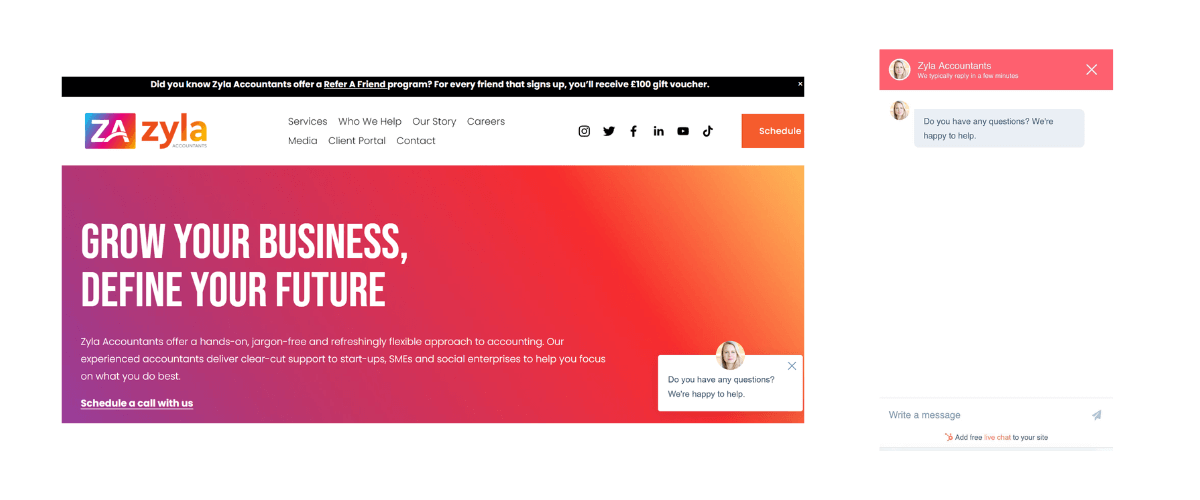Jump to a section
In today's competitive business landscape, leveraging artificial intelligence (AI) can be a game-changer for small businesses. AI-powered technologies such as chatbots, virtual assistants, and automated inventory management systems offer numerous benefits that streamline operations, save money, and optimise resources. In this article, we will explore five key ways AI can revolutionise your small business and give you a competitive edge.
Automating customer support
Customer support is an essential aspect of any business, but it can also be time-consuming and resource-intensive. AI-powered chatbots are revolutionising customer support by automating routine inquiries and providing instant responses. These intelligent bots can handle a wide range of customer queries, freeing up your team's time to focus on more complex issues. Additionally, chatbots offer 24/7 support, ensuring your customers receive prompt assistance whenever they need it.
Small businesses spanning various industries have embraced the implementation of chatbots, leading to notable outcomes such as enhanced customer satisfaction and substantial cost savings. A prime example is Suzy Kerton, the CEO of Zyla Accountants, a provider of cloud-based accountancy services for businesses & entrepreneurs.

Recognising the potential of chatbot technology, Suzy incorporated a chatbot on her company's website. This strategic move not only allowed her to capture the attention of potential customers but also streamlined the initial customer interaction process.
Improving inventory management
Effective inventory management is crucial for small businesses to maintain optimal stock levels and avoid unnecessary expenses. AI-powered inventory management systems leverage advanced algorithms to analyse historical data, predict demand patterns, and optimise stock levels accordingly. Let’s take a further look at how your small business could utilise AI systems:
- Demand forecasting: By analysing data, trends, and customer behaviour AI algorithms can accurately forecast demand. This would allow your business to optimise inventory levels, ensuring you have the right amount of stock available to meet demand without overstocking or risking selling out.
- Automatic reordering: Automate your reordering process by setting up predefined rules and triggers. Based on inventory thresholds and demand patterns, the system can automatically generate purchase orders or trigger alerts for restocking, reducing the risk of manual errors and ensuring a timely supply of goods.
- Supply chain optimisation: Through the analysis of supply chain data, including supplier performance, lead times, and transportation costs, AI can determine how best to optimise your supply chain. This allows you to identify inefficiencies, streamline logistics, and even reduce costs.
Amazon, for instance, has integrated artificial intelligence across its extensive inventory operations. A wide array of techniques, including time series prediction and reinforcement learning systems, is utilised in nearly every facet of their operations. From user demand and supplier backorders to warehouse optimisation and stock levels, machine learning and sophisticated AI systems guide and enhance decision-making processes.
Enhancing financial management
Managing finances can be a complex and time-consuming task for small businesses. AI-powered financial management tools simplify accounting processes, streamline bookkeeping, and enhance accuracy. These tools automate repetitive tasks such as data entry, invoice processing, and expense categorization, saving valuable time for business owners and accountants. AI can also analyse financial data, identify trends, and provide valuable insights for informed decision-making.

Utter Waffle is a small business that creates & serves award-winning waffle, started by James and Julia. They started out relying on manual spreadsheets, but as the business grew so did their revenue streams and staff! With this growth also came an increased danger of overlooking important financial details. QuickBooks' AI capabilities, including receipt capture and transaction matching, provided a seamless integration of their financial data. This feature not only gave them a clearer picture of their day-to-day operations but also saved them significant time.
Moreover, it automated the invoicing process, sending invoices to clients and issuing reminders. This automation freed up James and Julia to focus on other vital areas of the business, such as marketing, social media, and staff management. By leveraging the power of AI and delegating tasks, they were able to effectively distribute workloads and empower their team members.
Overall, utilising AI-driven features enabled Utter Waffle to streamline their financial management, increase efficiency, and adapt to the demands of their growing business.
Streamlining sales and marketing
AI-powered tools have transformed sales and marketing, providing automation and optimization for improved customer engagement. AI analyses data, predicts buying behaviour, and personalised marketing campaigns, enhancing targeting and conversion rates.
Examples include automated email marketing, chatbot-driven lead generation, and AI-powered CRM systems, all streamlining sales and marketing efforts. Moreover, AI aids in content creation by analysing data on audience preferences, suggesting topics and headlines, and even generating content itself.

One example of a business utilising AI in sales and marketing is Sephora, a global beauty brand. Sephora has embraced AI technology across their stores and apps, creating a seamless shopping experience for customers. They have incorporated various AI tools, such as chatbots for enhanced customer engagement and the Sephora Visual Artist for virtual makeovers and personalised tutorials.
These AI tools not only improve customer interactions but also encourage transactions by allowing the consumer to visualise product benefits post-transaction, thus enhancing the overall shopping journey.
Enhancing employee productivity
AI-powered tools can empower employees and enhance their productivity. Virtual assistants equipped with natural language processing capabilities can automate repetitive tasks, schedule appointments, and provide instant information, freeing up employees' time for more valuable work. AI can also analyse work patterns, identify bottlenecks, and suggest process improvements, helping employees work more efficiently.
One example of a company that uses AI-powered tools to enhance employee productivity is Salesforce. Salesforce is a cloud-based customer relationship management (CRM) platform that incorporates AI into its suite of productivity tools.
Salesforce's AI-powered tool called Einstein is designed to provide intelligent insights and recommendations to sales representatives, allowing them to prioritise leads, close deals faster, and optimise their sales strategies. Einstein uses machine learning algorithms to analyse vast amounts of customer data, including email interactions, social media activity, and past sales history, to identify patterns and predict customer behaviour.
The bottom line
In today's digital age, embracing AI is no longer a luxury but a necessity for small businesses aiming to remain competitive. By leveraging AI-powered technologies, such as chatbots, virtual assistants, and automated inventory management systems, businesses can streamline their operations, save valuable time and resources, and achieve higher efficiency. Whether it's automating customer support, optimising inventory management, streamlining financial processes, enhancing sales and marketing efforts, or boosting employee productivity, AI offers numerous benefits that can transform the way small businesses operate. Embrace the power of AI and stay ahead in the dynamic marketplace.











